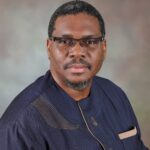Healing for a sick world
By Chinedu Oranye
When we served among the Mumuye tribe in the mountains of Northern Nigeria, we tried several methods to gain their trust and attention, but nothing worked…until we introduced medicine. Once we started administering medical treatments, people began to open up, and to God’s glory, we were able to plant a church among them before we left.
I fully believe in divine healing, but I am also a firm believer that God’s healing touch works through modern medicine too. People on those mountains suffered from all manner of sicknesses, and most were preventable and curable. The sick and the disabled carry a burden that most people don’t carry: a pain that is both physical and emotional. The people living with disabilities are often looked down upon and despised, and for that reason, they deserve special attention whenever we meet them.
Following in the steps of Jesus, missionaries are healers. Missionaries bring wholeness and restoration. In fact, people not only expect it; they sometimes demand it, and Jesus is not afraid of their demands. He wants us to rise up to the responsibility. When Jesus’ disciples failed to heal the epileptic boy, the father complained to Jesus, and His response to the disciples was, “O faithless and perverse generation, how long shall I be with you?” (Matt. 17:17). Jesus’ expectation was that His disciples would heal people. Healing is not for church folks alone; healing is God’s will for the nations, and medical missions is God’s mechanism to bring wholeness to the world.
According to the World Health Organization (WHO), “an estimated 1.3 billion people experience significant disability. This represents 16% of the world’s population, or 1 in 6 of us. Some persons with disabilities die up to 20 years earlier than those without disabilities” (https://bit.ly/3uKMmch). In addition, Science Daily states, “Over 95 per cent of the world’s population has health problems” (sciencedaily.com). Can you imagine that? We live in a world full of sicknesses and disabilities. The sick and disabled are a huge and needy people group. For this reason, every missionary association and church growth effort must include medical missions in their strategy. Modern medicine and therapy should be embraced as effective bridges to communicate God’s love to our needy world. To overlook this is to close wide doors of opportunity for Gospel expansion.
Back to my story about our ministry in the mountains of Northern Nigeria—prior to our arrival, there were no medical facilities whatsoever. People died of ordinary diseases that could have been cured. Introducing simple, healthy, and hygienic practices cut down the prevalence of diseases. Our presence revolutionized the community and increased life expectancy. And none of us was a fully trained medical doctor! Together with our basic medical services, we presented the Jesus who had sent us to them. And they gladly embraced Him. Don’t forget those figures: 16 per cent and 95 per cent. It’s time to engage.
In this edition of AfriGO, Dr. Dieudonne Lemfuka highlights the vital role of African health workers in advancing global missions. Our feature story shares Nuura’s* experiences as a missionary nurse among an unreached people group. In How We Did It, Dr. Prince Oteng-Boateng reveals how his mental health practice fits into Jesus’ command to “go and make disciples.” For our training pages, we have provided information about organizations that support health workers desiring to go into missions. Enjoy this issue of AfriGO, and share with others!!

Dr. Chinedu Oranye is a Nigerian Bible teacher, author, leadership mentor, and pastor. His ministry has taken him to over 30 countries, sharing and communicating Christ’s Gospel of love, redemption, and faith to the lost and the Church. He serves with Calvary Ministries (CAPRO) and Haggai International. He is married to Taiwo and they have three children. chinedu.oranye@gmail.com
